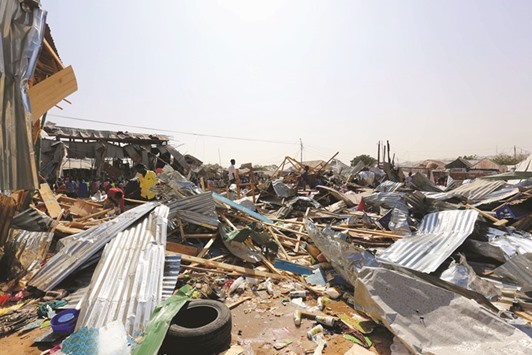The car was driven by a suicide bomber, said Ahmed Abdulle Afrax, the mayor of Wadajir district where the bombing happened.
“We carried 39 dead bodies and there were many others injured,” Dr Abdikadir Abdirahman, director of the Aamin Ambulance Service, told Reuters.
Madina hospital took in 47 injured people, Dr Mohamed Yusuf, the manager, said.
“There were many small scale traders alongside the road and teashops and restaurants. There were also members of the security forces and shoppers and the blast was so huge that it killed nearly 20 people immediately, most of them civilians,” said witness Sumayo Moalim.
Witness Abdulle Omar said the market was destroyed.
“I was in my shop when a car came in into the market and exploded. I saw more than 20 people lying on the ground. Most of them were dead,” he said.
The Shebaab, the Islamist insurgent group that is fighting the UN-backed Somali government, did not immediately claim responsibility.
The Shebaab has been able to carry out increasingly deadly bombings despite losing most of its territory to African Union (AU) peacekeepers supporting the Somali government.
This month Somalia elected a new president, Mohamed Abdullahi Mohamed – nicknamed Farmajo – a dual US-Somali citizen and former prime minister.
Civil war has riven Somalia since 1991.
Aid agencies warn that a drought has placed large swathes of the country at risk of famine.
The latest attack underlines the challenge facing the new president, who has inherited an administration with limited control over Somali territory due to the presence of Islamist militants.
Farmajo’s inauguration takes place on Wednesday, although he officially took office this week at a ceremony marred by a series of mortar strikes near the presidential palace which left two children dead.
AU troops drove Shebaab militants out of Mogadishu in August 2011 but the militants continue to control rural areas and launch repeated attacks in the capital.
In the week before the election on February 8 at least 28 people were killed when Shebaab militants struck a popular hotel in the capital.
And jitters over security meant MPs gathering to elect Farmajo last week had to meet in the capital’s heavily-secured “green zone” style airport compound.
Farmajo, whose brief stint at prime minister in 2010-11 showed him to be a no-nonsense leader set on improving governance and cracking down on corruption, is hugely popular in the country.
However turning around what is considered one of the world’s foremost failed states will be no easy task.
“I need the Somali public to understand how much the government is in need of their support. Government will need enough time address things,” the president said during the handover ceremony.
Somalia’s limited election process, in which only several thousand delegates voted for lawmakers, is seen as a step toward full democracy for the country, which has not had an effective central government since the collapse of Siad Barre’s military regime in 1991, which led to civil war and decades of anarchy.

